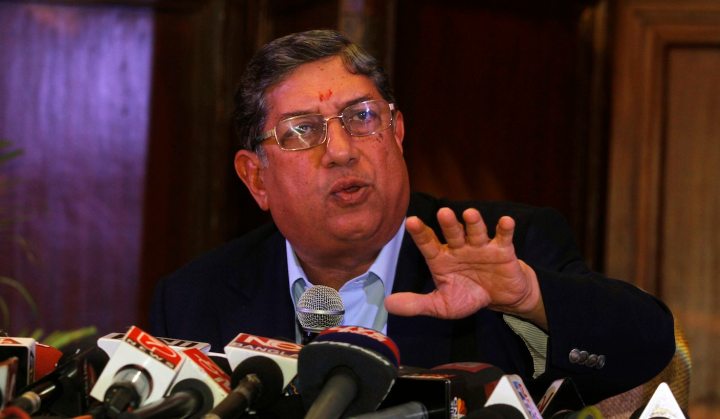Sport
The economy of cricket: BCCI want their cake and to eat it too

The BCCI have asked for a bigger slice of the ICC revenue pie because they make the pie and provide essential ingredients. In a utopian world, it makes little sense; economically, though, it’s an entirely fair demand. While much focus will be on how the BCCI are flexing their financial muscle yet again, the greater picture should not be ignored: cricket’s need for a parallel and independent economy. By ANTOINETTE MULLER.
Just a few days before South Africa and India are set to lock horns on the field, the Board of Control for Cricket in India has, once again, made headlines. If you were to conspiracy theories, you’d suggest that this was just another way of unsettling the tour and taking attention away from the cricket. But that would be foolish and conspiracy theories generally belong in deep enclaves on the internet.
The BCCI are now asking for a larger share of the ICC’s profits simply because, when it comes to generating broadcasting revenue at ICC tournaments, the BCCI’s market contribution is massive. With perked up eyebrows and a whole lot of snide mutterings, this news has been greeted as expected: shame on the BCCI. It’s not a BCCI-only problem or request, though. In fact, it’s not even a cricket-only request.
It has happened in rugby before. Back in 2004, with South African rugby contributing the highest percentage of viewers of SAZNAR’s partnership during the Super Rugby, they got a 38 percent share of broadcasting sponsorship revenues. New Zealand and Australia got 32 percent and 29 percent respectively.
Earlier this year, the ECB was also thought to move for ICC profits to be distributed according to “size” of the nation, meaning a bigger cut for England, Australia and India, but they insisted that they would ensure that the smaller nations do not suffer. Economically speaking, it’s a reasonable argument.
When one thinks about it a little bit more, one cannot blame the BCCI for wanting to take the pie. They not only bake that pie, they also provide the key ingredients. From a moral perspective, it’s silly and somewhat galling; from a purely economical perspective, it makes complete sense.
Cricket does not operate entirely on the values of communism. If it did, there wouldn’t be issues with teams losing profits when the big sides don’t tour. Test-playing nations would not be asking for grants from the sport’s parent body.
The BCCI will, once again, be seen as bullies, since that’s the reputation they have earned themselves. Morally, that assessment is correct; economically it’s another stark reminder that cricket needs to assess the way it operates, how it generates profit and the need to search for alternative streams of revenue, particularly in the broadcasting sphere.
Despite the economic woes from across the world, overall, cricket has proven to be remarkably recession-proof. In 2012, the ICC earned a surplus of $6.3 million. That was $4.3 million more than what was forecast. At the end of the current financial period for the ICC, which runs from 2007-2015, it’s expected that revenue will be around the $1.5 billion mark. Media rights, sponsorship rights and licensing rights all play a massive part in those. Broadcasting (or media rights) make up the biggest slice of the pie, with an estimate of $1.109 billion earned from it over the time-period.
But ICC still remains limited in how it is generating its revenue, and remains overly-reliant on income from broadcasting through ICC events. It needs to stretch its wings.
As technology continues to grow and expand and the way content is accessed becomes increasingly mobile, how on earth has the point of internet rights not been explored or at least trialled? Just imagine an on-demand highlights service, streaming audio service or other such alternatives, which could not only provide sources of income through broadcasting, but even through commercial deals if it is operated in-house by the ICC?
Cricket needs an alternative economy, one that does not rely on single powerhouses like India, England and Australia. Once over-reliance leads to complacency, cricket will be in deep waters. Internet rights and packages that potentially could play in the online and digital sphere does become complicated because if it were to be taken on as a global task, one would face global rights obstacles. That doesn’t mean it is impossible; in fact, when it comes to web and mobile rights, the possibilities are endless, and it’s important to try to think of alternative ways of generating profit, where relying on a powerhouse does not lead to awkward situations.
The difference in earnings is also another opportunity for the ICC to consider the way tours are currently structured. To pretend that the discrepancies in the scheduling is not damaging the game would be hypocritical.
Five-Test series remain a rarity, aside from the monopoly of England and Australia, who seem to be always playing each other, and now India and England next year. In the next 18 months, England will have play three five-Test series. The imbalance is brutal. To fairly distribute revenue, combat lopsided itineraries, why not standardise all tours to include three Tests, three ODIs and three T20s?
Not only will this allow players who play across all format some much-needed reprieve, but it will also work towards making it much easier to structure the home-and-away model across a two-year period. If that kind of format is adopted, it’s also worth considering adopting an alternative revenue stream for those Test teams and the revenues generated from Test cricket could either be pooled and divided according to where a team is ranked, or a percentage is pooled and divided equally.
Broadly speaking, the problem with the BCCI is perhaps not their demanding what is rightfully theirs, but rather where the money will go, the flexing of their muscles and a flurry of contempt which they have stirred up over the last year or two for their sheer disregard of Future Tours Agreements.
The motives of those in charge of the BCCI will, of course, be questioned, and rightfully so. However, the idea of how revenue is shared and ways of generating an alternative source of income, creating an independent economy which is not reliant on whoever holds the aces, is a crucial point which should not be forgotten amongst all this posturing. DM
Photo: Indian cricket board (BCCI) President N. Srinivasan (REUTERS/Rupak De Chowdhuri)




















 Become an Insider
Become an Insider